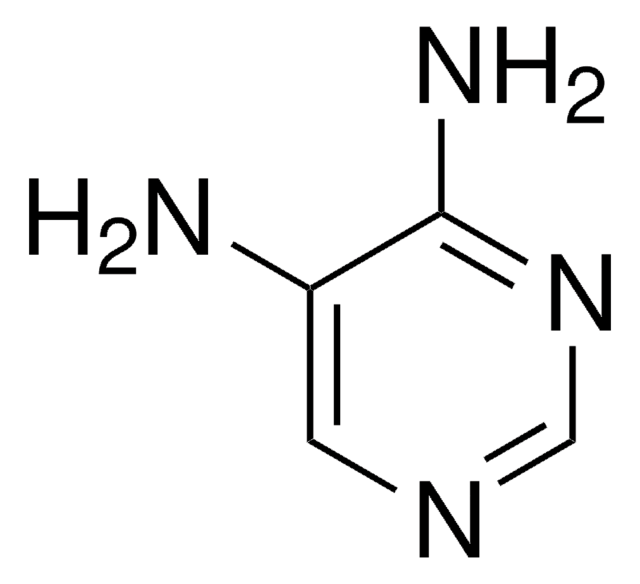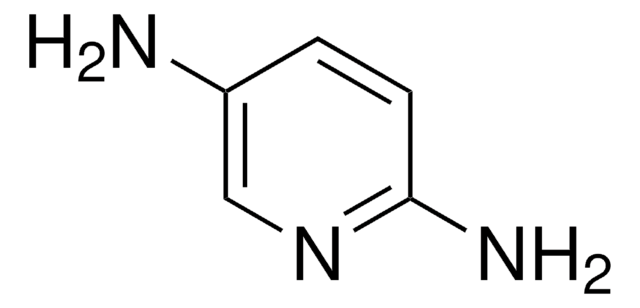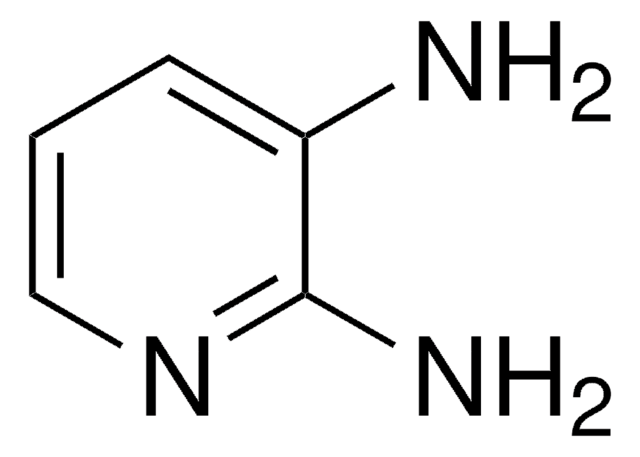All Photos(3)
About This Item
Empirical Formula (Hill Notation):
C4H6N4
CAS Number:
Molecular Weight:
110.12
EC Number:
MDL number:
UNSPSC Code:
12352100
PubChem Substance ID:
NACRES:
NA.22
Recommended Products
Quality Level
assay
98%
mp
143-147 °C (lit.)
SMILES string
Nc1ccnc(N)n1
InChI
1S/C4H6N4/c5-3-1-2-7-4(6)8-3/h1-2H,(H4,5,6,7,8)
InChI key
YAAWASYJIRZXSZ-UHFFFAOYSA-N
Looking for similar products? Visit Product Comparison Guide
signalword
Warning
hcodes
Hazard Classifications
Eye Irrit. 2 - Skin Irrit. 2 - STOT SE 3
target_organs
Respiratory system
Storage Class
11 - Combustible Solids
wgk_germany
WGK 3
flash_point_f
Not applicable
flash_point_c
Not applicable
ppe
dust mask type N95 (US), Eyeshields, Gloves
Choose from one of the most recent versions:
Already Own This Product?
Find documentation for the products that you have recently purchased in the Document Library.
Customers Also Viewed
Hydrogen-bonded supramolecular structures in co-crystals of ?-or ?-diketone enols with 2, 6-diaminopyridine or 2, 4-diaminopyrimidine.
Bertolasi V, et al.
New. J. Chem., 26(11), 1559-1566 (2002)
Wenbo Zhou et al.
European journal of medicinal chemistry, 96, 269-280 (2015-04-23)
Therapeutics of metastatic or triple-negative breast cancer are still challenging in clinical. Herein we demonstrated the design and optimization of a series of hybrid of 2,4-diaminopyrimidine and arylthiazole derivatives for their anti-proliferative properties against two breast cancer cell lines (MCF-7
Wilhelm Maximilian Hützler et al.
Acta crystallographica. Section C, Structural chemistry, 71(Pt 3), 229-238 (2015-03-04)
The results of seven cocrystallization experiments of the antithyroid drug 6-methyl-2-thiouracil (MTU), C(5)H(6)N(2)OS, with 2,4-diaminopyrimidine, 2,4,6-triaminopyrimidine and 6-amino-3H-isocytosine (viz. 2,6-diamino-3H-pyrimidin-4-one) are reported. MTU features an ADA (A = acceptor and D = donor) hydrogen-bonding site, while the three coformers show
Christopher M Harris et al.
Bioorganic & medicinal chemistry letters, 20(1), 334-337 (2009-11-21)
We describe structure-based optimization of a series of novel 2,4-diaminopyrimidine MK2 inhibitors. Co-crystal structures (see accompanying Letter) demonstrated a unique inhibitor binding mode. Resulting inhibitors had IC(50) values as low as 19nM and moderate selectivity against a kinase panel. Compounds
Michael D Serby et al.
Journal of medicinal chemistry, 49(8), 2568-2578 (2006-04-14)
Ghrelin, a gut-derived orexigenic hormone, is an endogenous ligand of the growth hormone secretagogue receptor (GHS-R). Centrally administered ghrelin has been shown to cause hunger and increase food intake in rodents. Inhibition of ghrelin actions with ghrelin antibody, peptidyl GHS-R
Our team of scientists has experience in all areas of research including Life Science, Material Science, Chemical Synthesis, Chromatography, Analytical and many others.
Contact Technical Service












